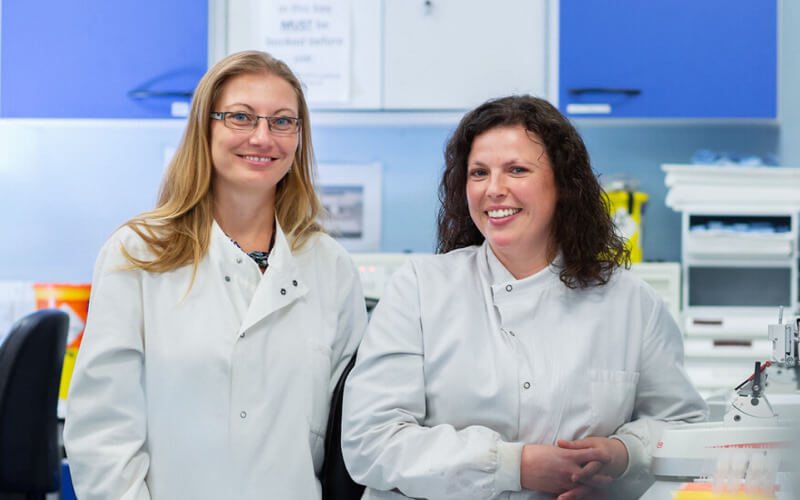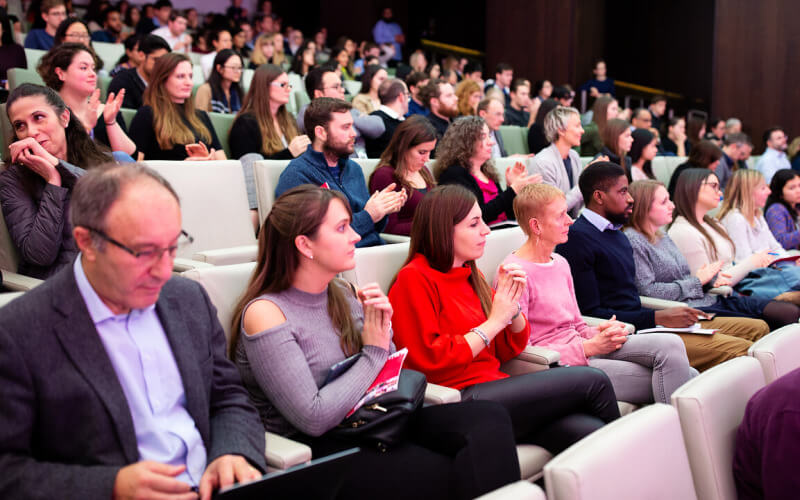Medical Sciences Lecture Series
The public lecture series will return in the autumn.
Catch up with recent events
Too little, (not) too late?
It is 165 years since we were first warned of the dangers posed by accumulating greenhouse gas emissions. These warnings have been repeated ever more stridently by the world's scientists for more than 3 decades. But still we have done nothing. Is it too late? Can anything be done? And, if so, who should do it? Prof. Hugh Montgomery presents the science of how we came to be where we are and what is coming, before proposing actions we must all take.
AI, Smartphones and Lung Health: Breathless with Excitement
Over 600 million people worldwide live with long-term lung health problems such as asthma and chronic obstructive pulmonary disease (COPD). We urgently need better ways to diagnose and treat them. Artificial Intelligence (AI) has the potential to transform healthcare. Prof. John Hurst and Dr Luke Hale review how AI can improve the care of those living with asthma and COPD, including a smartphone platform under development for patients with these conditions.
Adapting to life in the liver: An immune cell perspective
We are all continually influenced by our location, environmental factors, the people we encounter, and even how hungry we are at a given moment. Immune cells are no different. For World Liver Day, Dr Laura Pallett discusses how the identity and function of immune cells is influenced by such factors. We focus on a subset of immune cells in the human liver known as 'resident T cells' that are highly specialised, trained assassins, that help to control infections and tumour cell growth.
Women in Medicine and the Gender Pay Gap
Women have worked in medicine for over 100 years but are still under-represented at the top of the profession. This is a reflection of women in society. Women have struggled to reach equality of both status and pay. The Gender Pay Gap in medicine is large for a single professional group. To mark International Womens Day, Prof. Dame Jane Dacre explores gender pay inequality in the medical field and highlights strategies that could help address pay disparities.
Injury and brain cancer, two sides of the same coin?
Glioblastoma is the most common type of brain tumour in adults. Though current treatments extend survival, they do not cure. Tumours arise from cells that acquire mutations and begin to divide uncontrollably. However, recent studies show that even normal tissues contain many mutations. Prof. Simona Parrinello discusses how brain injury shapes all stages of glioblastoma development and how unravelling this interaction is beginning to uncover new avenues for intervention.
Painless restoration of children's teeth
In the UK, 24% of five-year-old children have caries affecting 3-4 of their teeth but less than 10% are filled. Silver mercury amalgam fillings for children were recently banned due to toxic environmental effects. The alternatives are time-consuming to place, making them unsuitable for young children. We have developed SMART composites that can be painlessly placed in <5 minutes. Prof. Anne Young and Prof. Paul Ashley discuss getting these new materials into clinical trials.
VR in Healthcare - sensorimotor interventions
Interest is growing in the use of Virtual Reality (VR) and robots in rehabilitation and clinical (surgical) training. Today, VR technology is applied to advanced fields of medicine, engineering, education, design, training, and entertainment. VR uses computer interfaces to give immersive 3D visual experiences. Prof. Rui Loureiro examines new ways of using VR and robots for clinical training, showing how it can have a positive impact on the recovery of cognitive and physical injuries.
Type one diabetes - exciting new developments in treatment and prevention
Type one diabetes is an autoimmune condition which results in absolute lack of insulin. Treatment has focused for many years on the replacement of insulin but we are entering an exciting new era where there is a real possibility of prevention. Dr Miranda Rosenthal, Consultant (Diabetes) at the Institute of Immunity and Transplantation (IIT) covers these new developments and the new treatment options for those living with T1D.
Are biologic drugs to treat rheumatoid arthritis harmful in pregnancy?
Rheumatoid arthritis affects around 1% of people, but is more common in women. It often requires biologic drugs to control symptoms and prevent joint damage. When women under treatment become pregnant, there is uncertainty if biologic drugs should stop. Treatment of RA in pregnancy is important because active arthritis may increase risk of adverse outcomes and is more likely if biologic drugs are stopped. Prof. Ian Giles discusses whether stopping biologic drugs in pregnancy has harmful effects.
Past events
2022/23 Lecture Series
- Dr Anastasia Kalea - How can we end weight stigma in healthcare?
- Prof. Sam Janes - Making inroads into the early diagnosis of lung cancer
- Prof. Hara Trouli - What is Performing Arts Medicine and why are artists' health needs so important?
- Prof. Rob Heyderman - Defeating Pneumonia and Meningitis with Vaccines
- Dr Mariam Jamal-Hanjani - Harnessing lung cancer evolution for clinical benefit
- Dr Adesh Sudaresan, Dr Harry Kennard, Dr Manraj Phull - Room 1 for Dr Climate - the clinic we can’t afford to miss
- Dr Mariana Diniz - Can local T cell immunity contribute to protection against SARS-CoV-2?
- Prof. Keith Gomez - World Thrombosis Day | Understanding why some people get blood clots
2021/22 Lecture Series
- Dr Claire Roddie - Can We Use the Immune System to Fight Cancer?
- Prof Greg Towers - SARS-CoV-2 and COVID-19: What have we learned and what’s next?
- Dr Paul Craddock - From Lamb’s Blood to Pig Hearts: A New Renaissance in Transplant Surgery
- Prof Wenhui Song - Can We Grow Artificial Tissues and Organs in the Lab?
- Dr Deepak Kalaskar - Could 3D Printing Revolutionise Our Healthcare?
- Dr Susan Parekh - Why is Dental Health so Important for Children?
- Prof Kurinchi Gurusamy - What is Evidence-based Medicine and Why Does It Matter?
2020/2021 Lecture Series
- Prof Emma Morris - Gene & Stem Cell Therapies: Correcting Nature's Spelling Mistakes
- Prof Tim McHugh - Antimicrobial Resistance: The Pandemic That Is Forgotten But Not Gone
- Prof Gavin Jell - Nanomedicine: Form Cancer to COVID-19
- Prof Jayant Vaidya - 'One-Shot' Radiotherapy Safer And As Effective For Treating Breast Cancer As Longer Course
- Prof Thumbi Ndung'u - Should We Still Care About HIV?
 Close
Close



